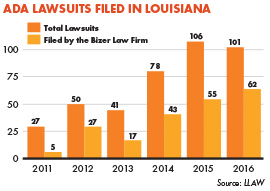WIDESPREAD JUDICIAL CORRUPTION
Corruption in Louisiana courts is a cancer eating away at the heart of the state’s justice system. There has been evidence of inefficiency, incompetence and unethical conduct by members of the bar, court staff and judges for decades.
For proof we need look no further than news headlines. In the early 2000s the FBI’s sprawling investigation dubbed “Operation Wrinkled Robe” ensnared four state judges and dozens of well-known attorneys and bail bondsmen, all of whom took part in an illegal kickback scheme at the parish courthouse.
In 2010, the Louisiana judiciary suffered another national embarrassment when Congress impeached former New Orleans federal Judge Thomas Porteous for a litany of charges, including accepting cash and gifts from lawyers with cases pending in his court.
Another glaring, long-running saga of judicial misconduct finally climaxed in 2017 as former Louisiana 18th Judicial District Judge J. Robin Free, who developed a national reputation as a repeat offender with numerous ethical lapses over two decades, was forced to resign.
In 2001 Judge Free was admonished twice by the Louisiana Judiciary Commission after he failed to recuse himself in two separate cases in which he knew the defendants. After being censured by the judiciary commission, he assured its members that he had learned from his mistakes. But apparently not.
In 2009, Judge Free again refused to recuse himself from an environmental class-action lawsuit alleging groundwater contamination, even though his mother lived within the allegedly contaminated area and was therefore part of the affected class. He eventually received a 30-day slap-on-the-wrist suspension from the Louisiana Supreme Court for his third ethical transgression, but his inappropriate conduct continued.
In 2015 Judge Free was suspended again for 30 days without pay and forced to pay a $7,000 fine after the state’s high court concluded he had “harmed the integrity of and respect for the judiciary” by accepting lavish gifts from trial lawyers involved in a case before his court.
In 2016 he was suspended yet again—this time for one year without pay and fined $11,000—for abusing his contempt authority in formal proceedings and making inappropriate comments toward women during domestic abuse hearings. More recently, the judge came under investigation after several bizarre confrontations with local law enforcement officers and, thankfully, Judge Free announced his retirement in June 2017.
But that he was allowed to resign, rather than being forcefully removed from the bench by his peers much earlier in his disgraceful judicial career suggests many Louisiana judges and justices may be more concerned with protecting each other than the public interest.
These and many other instances of influence peddling, cronyism and corruption contribute to Louisiana’s stubborn reputation as a Judicial Hellhole. Since 2000, at least 10 Louisiana judges have been removed or resigned their seat on the bench due to judicial misconduct, while many others have been sanctioned. And a review of state Supreme Court judicial misconduct opinions shows more than 40 Louisiana judges have been publicly disciplined by the high court over the last decade for violating their oaths and abusing the authority.
Such conduct has eroded the public’s trust in the state’s judiciary. It also discourages business large and small from investing in and creating new jobs for Louisiana’s struggling economy. So if the judiciary is unwilling or unable to hold themselves to a much higher standard of ethical conduct, then the state lawmakers should take action to implement standard-raising reforms. Improving transparency and accountability throughout the judiciary are a must.






